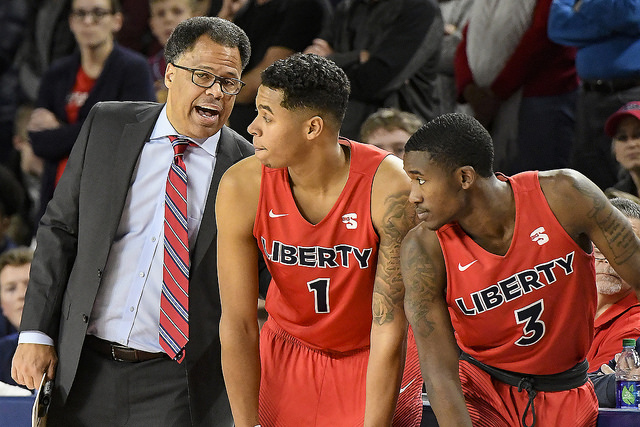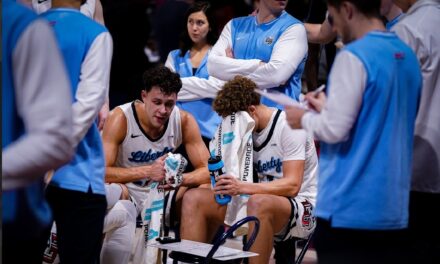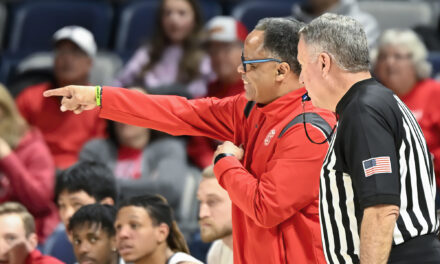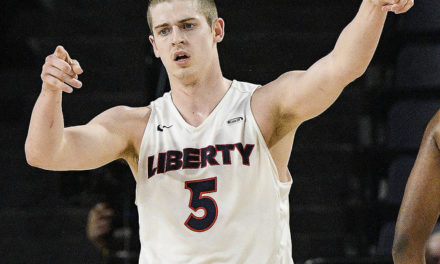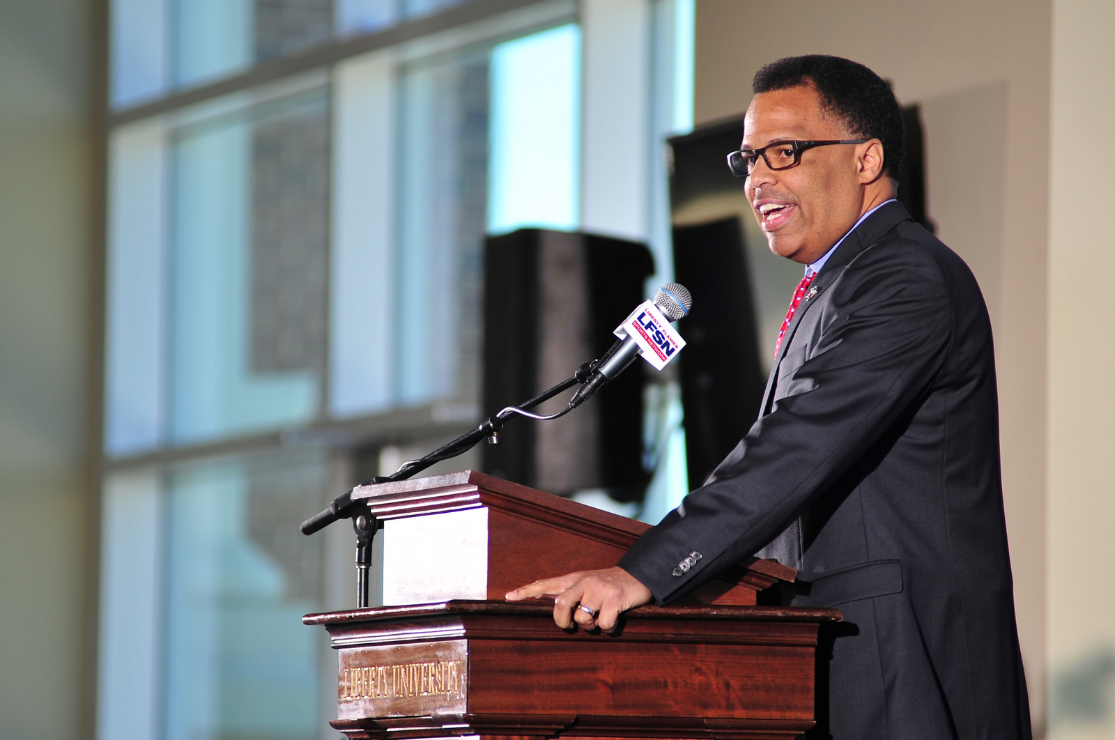As he prepares his team for the 2019 NCAA Tournament, in his 17th season as a head coach, it was Ritchie McKay’s time as an assistant at Virginia for 6 years that remade him as a coach and was the launching point for his current string of success at Liberty.
McKay has been a head coach in countless different situations – at a start-up program, at a mid-major that changed conferences during his tenure (twice), at a Power 5, and at New Mexico.
His path led him to being the head coach for the Lobos at the young age of 37. That was his dream job. His late father, Joe McKay, played at New Mexico in the 1960s and Ritchie grew up a Lobo fan. During his 5th season as head coach, McKay was let go, unfairly so in Virginia head coach Tony Bennett’s opinion. (If you would like a great read into all the ups and downs McKay went through at New Mexico read this story from the Albuquerque Journal).
Shortly thereafter, former Liberty Athletic Director Jeff Barber hired McKay as the Flames’ head coach. In just his 2nd year, he brought in the most highly anticipated recruiting class – dubbed the Magnificent 7. The class, highlighted by current Portland Trail Blazers guard Seth Curry, pushed the Flames to 23 wins and a CIT appearance in 2009. With Curry and the entire freshman class set to come back for three more seasons, it looked like McKay was on the fast track back to the big time once again.
But then Seth Curry decided to transfer to Duke, 2 other freshmen elected to transfer as well, and it looked like McKay was facing another rebuild.
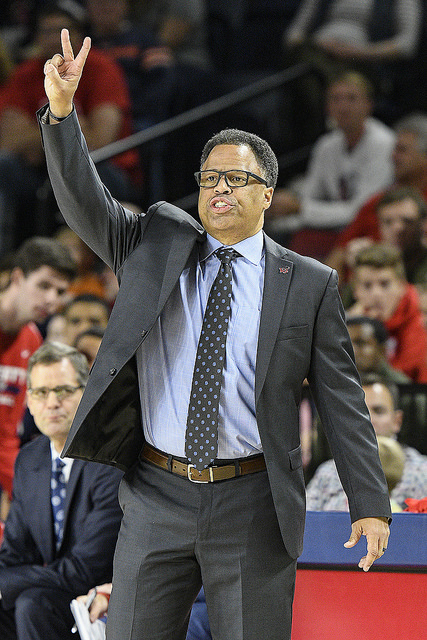
McKay is making his 2nd NCAA Tournament appearance as a head coach
Meanwhile, his longtime friend and son of one of his coaching mentors, Tony Bennett, got the job as head coach of Virginia just an hour away. Bennett pleaded for McKay to join him in Charlottesville as an assistant, something he hadn’t been in nearly 15 years.
“I knew that was a hard decision,” Tony Bennett said of McKay choosing to become an assistant. “That’s always tough – you go from being in charge of the program. It’s just a different role. So, I certainly understood that. For him to be faithful to what he was feeling in his heart and mind about making that decision, I feel for whatever reason, he felt drawn to this, to try and build a program at a place like Virginia, with a friend, who has like-minded beliefs. I think those things were strong in his heart.”
Throughout Bennett’s career as a head coach, he always had someone on his staff who had learned through the successes and failures of being a head coach.
“That was of extreme importance to me,” Bennett said of hiring a former head coach. “The fact that Ritchie had some familiarity with the area and, probably the thing that was above all that, is this is a man that I know. I know who he is. I know what he stands for. There’s such a comfort level in the relationship and the trust – it wasn’t just a guy I’ve never met or got good recommendations for. When you put those things together and, obviously, he’s coached at the highest level, that was a homerun for me and a great security blanket. I was just so thankful for when he decided to come (to Virginia). I knew it would be so important. I knew we were, in a way, commissioned to go together and try to build this thing.”
And build the thing they did.
Virginia was coming off a 12-year span with only 2 NCAA Tournament appearances, quite a drop off from a span of 17 seasons from 1981-1997 where the Cavaliers had 13 NCAA Tournament appearances. McKay and Bennett struggled through their first two seasons, going 31-31 and failing to make any postseason tournament. In year 3, UVA utilized a 13-1 non-conference record to advance to the program’s first NCAA Tournament appearance in 5 years. By year 6, McKay and Bennett had guided the Cavaliers to 3 NCAA Tournament appearances, including two straight as either a number 1 or 2 seed, and consecutive 30-win seasons.
“There’s a wisdom that certainly success teaches you, but there’s also probably a deeper, stronger wisdom that when it doesn’t go well teaches you,” Bennett said of the road McKay has travelled. “When you’re building a program, you go through hard times, and Ritchie would look at me so many times in the early years and certainly after success and say, ‘Tony, this is what you do, it’s not who you are.'”
His time at Virginia helped him rediscover that, and he was ready for his next challenge. At the end of the 2014-15 season, Liberty and Jeff Barber were looking for a new head coach. McKay was the first man Barber called when the job came open. After interviewing 6 other candidates, McKay was brought back to Liberty Mountain with plans to help revive a program that had grown stagnant, losing 84 games over the previous 4 seasons and one of the worst teams in a low major conference.
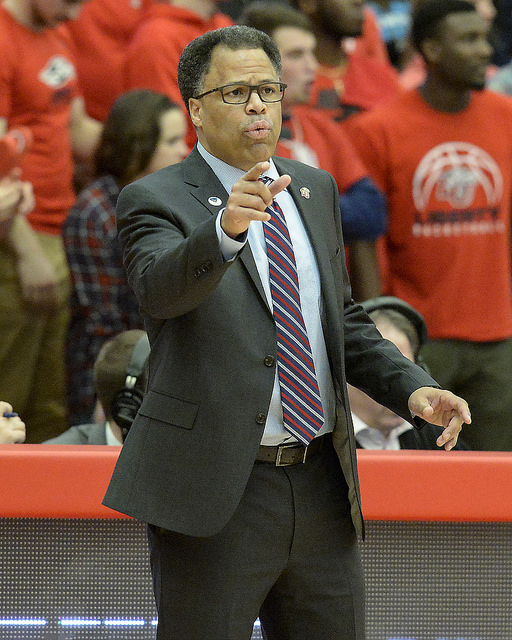
McKay is 123-82 in 6 seasons at Liberty
The task was grand, but his time at Virginia prepared him for this journey. He earned a master’s degree in the packline defense and learned how Bennett built his program. That time also afforded him the ability to take a step back and redefine himself as a coach. It also gave him a sense of renewal both on and off the court. He was able to watch a program get built from the ground up at a different perspective, enabling McKay to process the program build differently than if he was the head man.
“I got mindspace back,” McKay said of his time at Virginia. “I think, sometimes, when you’re a head coach, especially given the path I took to get there and the circumstances that happened in my family and in my individual life, when you operate out of a place of woundedness, you will fill that wound with whatever you can. For me, it was performance – gaining an identity from success and affirmation – and that’s a hard road to hoe because it is very unfulfilling and unsustainable. I think just being able to slow and just start walking was really good for me. I didn’t have the pressures or the magnitude or responsibility that a head coach has. I got a chance just to serve Tony (Bennett), but I also got to watch him. That was just like a classroom. I learned a whole lot and got a chance to pour into some players. I just think it helped reshape my intentions in being in coaching, as well as, obviously, the basketball part. I was better equipped to be a head coach.”
Early in his coaching career, McKay learned the packline from Tony’s dad Dick Bennett, but Ritchie was always an offensive-minded coach. Many of his early teams were built around offensively talented players like Danny Granger and Seth Curry. It wasn’t until his time at Virginia where he earned a Master’s (as he has commonly referred to it) in the packline defense.
“The 6 years being with Tony were really transformational in both of our coaching careers,” McKay’s longtime friend and Liberty associate head coach Brad Soucie said. “When you go to Virginia and you learn the defensive system, the other side of the ball and be able to have something that you can build upon each year, that is a real separator. Most programs, it was us before Virginia, focus on offense. Being able to be good on both sides of the ball is a real difference maker. The things we learned there is just huge, and he’s done a great job of implementing them here.”
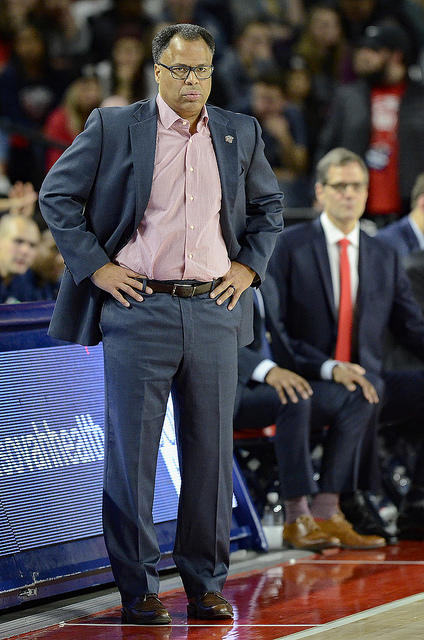
“Those guys are like family to us,” McKay said of his friends at UVA
McKay and the Flames are on the heels of the most successful Liberty season in school history. A school record 28 wins and regular and postseason conference championships are already in the books and just his 2nd ever NCAA Tournament appearance as a head coach is on the horizon. Liberty has become Virginia-lite as some have referred to them, being a pest on the defensive end of the floor while one of the most efficient teams in the country on offense.
It took him 17 years as a head coach to get here, but McKay has reached a level the Liberty program has never seen before, and the way he has built it, it is built to last. McKay took the slow and steady approach, building it with guys who fit the culture of the school. The success seen this season, should be just the tip of the iceberg as to what Liberty fans could see in the next few years with McKay at the helm.
If you’re anything like me, you were mad at him for leaving Liberty to go to Virginia. You felt used. He had promised to deliver the program to heights we have never seen before, and he jumped ship at the first sign of adversity. But it was leaving that allowed him to reshape himself as a person and a coach, and we’re all better off now from his time at Virginia.
“I think Ritchie is just flat-out a heck of a coach,” Bennett said. “He knows the game on both ends. He came here and helped me, and I learned more from him on the court and off the court than he learned from me. I think (his time here) just reaffirmed what he knew was right and then he went with it.”

